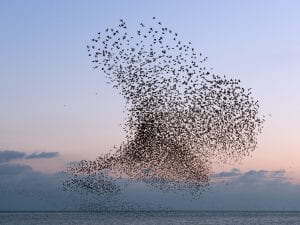Members of the project team report on the many successes of the Queer Peers project in 2022
How is queer wellbeing nurtured locally, outside of traditional ‘mental health’ care?
The Queer Peers project, jointly funded by the Centre for Arts and Wellbeing and the School of Humanities and Social Sciences, held an inspiring afternoon of talks, crafts and research at the new Ledward Centre. The result was a weaving together of different and diverse voices, images, and impressions – not always sitting comfortably, or with the intention of doing so, but capturing the multiplicity of diverse communities.

We started by sharing findings and research poems from previous research on emotional support between friends and community members in a queer community pub. The Marlborough, known affectionately both locally and nationally as ‘The Marly’ has recently reopened as The Actors, and remains a queer friendly space. Former manager of the Marly, Tarik Elmoutawakil, and former resident, Roni Guetta, reflected on the magic of that venue, the under-acknowledged work of creating inclusive community spaces, the fragility of those spaces under the constraints of capitalist models for pubs and other venues, and the limits of inclusivity. They also spoke about the life-enhancing value of creativity and joy, and where they find that now, both informally and through their current community organisation activities. Performance poets Annie Whilby and Subira electrified the room with a joyous unpacking of the many LGBTQIA+ identities housed in that acronym, and a compelling, layered callout of intersectional racism in queer spaces.
 During afternoon workshops, guests sketched out current places and practices of queer wellbeing and explored multi-layered imaginings of what a community that centres queer wellbeing is, or could be. They used collaborative collage techniques and cut-up poetry to explore what queer wellbeing meant to them and ‘map’ queer wellbeing in Brighton & Hove. Participants took a range of approaches to this – sometimes provocative, sometimes elegiac, sometimes celebratory.
During afternoon workshops, guests sketched out current places and practices of queer wellbeing and explored multi-layered imaginings of what a community that centres queer wellbeing is, or could be. They used collaborative collage techniques and cut-up poetry to explore what queer wellbeing meant to them and ‘map’ queer wellbeing in Brighton & Hove. Participants took a range of approaches to this – sometimes provocative, sometimes elegiac, sometimes celebratory.
We were particularly interested in questioning what supports queer wellbeing, through connection, creativity and community. Participants explored the different meanings this has for them, mentioning aspects like having physical spaces and community-led groups to freely move their bodies outside, find joy in sport, dancing, meet friends, socialise without alcohol, explore intimacy, share massage, connect with other queer people of colour or other older LGBTQIA+ people, feel safety against racism, mourn those who have passed, create poetry, access spaces in non-normative bodies, be in the sea, and engage in sex work.
 Following on from this inspiring event, we are preparing a summary of findings and suggested strategies, with plans to engage LGBTQIA+ cultural, heritage and well-being organisations throughout the city. Please get in touch with us if you want to be a part of this future work in some way, big or small! Part of this is developing plans for further research, but feedback from many guests was that they wanted to keep these conversations (and creative collaborations) flowing now. The time certainly seems right, as the city is re-creating its community spaces, and the opening of the Ledward Centre marks a new beat in the long history of LGTBQIA+ community and culture in Brighton & Hove. This afternoon showed us that creative practices have the potential to carry the complexity involved in crafting a community that centres queer wellbeing, wherever, however and with whomever it may happen.
Following on from this inspiring event, we are preparing a summary of findings and suggested strategies, with plans to engage LGBTQIA+ cultural, heritage and well-being organisations throughout the city. Please get in touch with us if you want to be a part of this future work in some way, big or small! Part of this is developing plans for further research, but feedback from many guests was that they wanted to keep these conversations (and creative collaborations) flowing now. The time certainly seems right, as the city is re-creating its community spaces, and the opening of the Ledward Centre marks a new beat in the long history of LGTBQIA+ community and culture in Brighton & Hove. This afternoon showed us that creative practices have the potential to carry the complexity involved in crafting a community that centres queer wellbeing, wherever, however and with whomever it may happen.
The Queer Peers project team includes researchers Charlotte Wilcox, Rebecca Graber, Helen Johnson and Kay Aranda, with research assistance from doctoral scholar H Howitt, and advisory support from doctoral scholars H Howitt, Annie Whilby and Matt Smith, HSS academic Laura Harvey, and NHS commissioners Nicky Cambridge and Helen Davies. Contact us at R.Graber@brighton.ac.uk or C.Wilcox@brighton.ac.uk





Leave a Reply